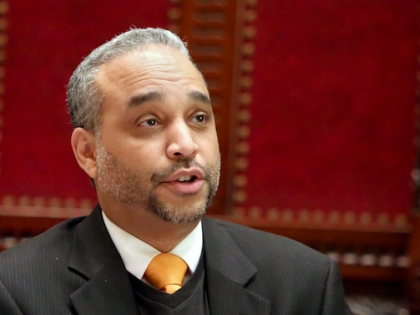
Senator Peralta: Human Trafficking Keeping Roosevelt Avenue Pimps In Business
Jose Peralta
May 19, 2011
-
ISSUE:
- Human Rights
State Senator Jose R. Peralta today stepped up his offensive against the sex trade flourishing on Roosevelt Avenue in Corona and Jackson Heights with the introduction of a bill meant to curb the “free delivery” of women offered by local pimps and the shuttling of johns from Midtown Manhattan into Central Queens.
The bill requires taxi and livery cab drivers to be made aware of the human trafficking that supplies the women that keep pimps in business. New York City taxi drivers already undergo a training program for initial licensure and subsequent renewal. Senator Peralta also will be co-sponsoring a bill to raise fines and lengthen jail sentences for soliciting a prostitute.
“We have to dispel the dangerous notion that prostitution is a victimless crime,” Senator Peralta said. “The fact is, many women from around the world and across the country are brought here and enslaved, forced to have sex with strangers for the profit of human traffickers and pimps.
“Someone aware of this brutal reality is less likely to participate in the continued exploitation of these women,” Senator Peralta said. “Someone who better understands the plight of these women, who recognizes that prostitution is not some sort of consensual business transaction, is also more likely to say something if they see something.”
At a press conference about the bill in his office, Senator Peralta was joined by Faith Huckel, executive director and co-founder of Restore NYC, a nonprofit that helps sex-trafficking victims and partners with local and federal officials to facilitate the prosecution of traffickers.
“There are some 27 million slaves in the world today, more than at any other time in human history,” Huckel said. “Most are trafficked for commercial sexual exploitation and 80 percent are female. Traffickers prey on the poor and vulnerable. They use promises of a good job or a false marriage proposal to lure victims into situations of sex trafficking. Other victims are kidnapped or sold into the sex trade by parents, husbands or boyfriends.
“Sex trafficking in New York City takes place in a variety of public and private locations,” Huckel added. “By raising public awareness about what is really going on, there will be a greater flow of information to law enforcement, helping bring perpetrators of sex trafficking to justice and preventing them from continuing to exploit victims.”
The senator was also joined at the press conference by Felix Suero, president of Dominicana Radio Dispatch Inc., a livery cab service based in Corona.
“I agree with Senator Peralta that drivers who understand what is really happening to these women are less likely to do anything that will make their situation worse, and are more likely to say something if they see something,” Suero said.
“The drivers working for my company are as honest as they are hardworking,” Suero added. “This bill will help make sure that future drivers are that way too.”
Senator Peralta said he will be co-sponsoring a bill to raise fines and lengthen jail sentences for soliciting a prostitute, saying that it was “outrageous,” for example, that patronizing a prostitute in the first degree—defined as soliciting a minor of less than 11 years of age—carries a penalty of only two to seven years in jail and a maximum fine of $5,000.
Whether they drive themselves, are shuttled in by cab drivers who recruited them in Midtown Manhattan, or arrive via one of the various means of public transportation connecting Roosevelt Avenue to points throughout the city, johns descend on the stretch of Roosevelt Avenue from approximately 69th Street to 112th Street ready for sex and willing to pay for it.
Some patronize restaurants reportedly offering packages that include dinner, drinks and a woman. Others hop into mobile brothels parked along the avenue. Those with a preferred location of their own take advantage of the many offers of “free delivery.”
This stretch of Roosevelt Avenue is a very different kind of destination than the one State Senator Jose Peralta envisions for the area: A modern, thriving, urban commercial district, a magnet for city residents, visitors and tourists who already travel through the area by the millions every year on their way to and from Mets games, the U.S. Open and concerts, festivals and other activities in Flushing Meadows Corona Park.
The senator previously introduced a bill prohibiting the distribution of the ads for prostitutes that end up littering sidewalks on Roosevelt Avenue and adjacent streets, where they lie in full view of young children on their way to school.
The “chica cards,” as they are known locally, featuring pictures of naked and minimally clad women and promising “free delivery,” are the business cards of the pimps operating in the area.